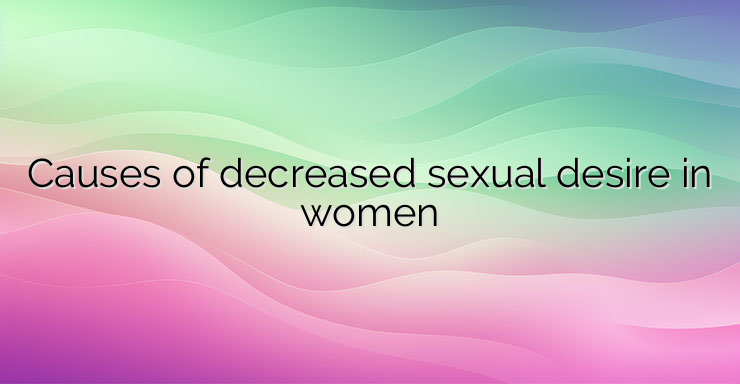Libido is a general sexual desire or desire for sexual activity, which includes sex with a partner or masturbation. It naturally varies from person to person and can vary throughout life. Some people have sex or want to have sex every day, while for others it may be enough to have sex once a week or less, and with age or circumstances this period may increase. There is no right or wrong level of libido. Libido is influenced by biological, psychological and social factors. Biologically, sex hormones (testosterone and estrogen) and neurotransmitters (such as dopamine and oxytocin) regulate libido. Low libido is common. It can be temporary or long term. It affects up to 2 in 5 women at some point in their lives. It is completely normal to experience a drop in sexual desire more than once in every woman’s life. The main symptom of low libido is a decreased sexual desire compared to the usual interest in sex. Low libido can be due to: Relationship problems; Medical condition; Hormonal imbalance; Mental health status; Certain medications; Stress; Aging. 1. Psychological and social factors that can lead to a decrease in sexual desire include: Problems in the relationship with the partner. Relationship problems, such as problems with communication, trust, or intimacy, are among the most common causes of decreased sex drive. A couple’s desire for sex also tends to decrease over the course of their relationship. Stress and exhaustion. Stress, including stress from work, family or life in general, can reduce sexual desire. Chronic stress can also affect hormone levels, leading to a lower libido. Depression. Low self-esteem, feelings of hopelessness and physical fatigue can reduce libido. Depression also causes an imbalance of neurotransmitters that help regulate libido. 2. Health conditions that can lead to decreased sex drive in women include, but are not limited to: Headaches; Infections – diseases such as vaginal yeast infections or urinary tract infections are among the main causes of decreased sexual desire; Hypertension; Chronic pain; Hypothyroidism; Hyperprolactinemia; Diabetes; Heart disease; Rheumatoid arthritis; Chronic kidney disease, etc. severe diseases. 3. Other causes of low libido include: Alcohol consumption, smoking or drug use. Drinking large amounts of alcohol and using drugs can lead to loss of sex drive. Pregnancy, childbirth and breastfeeding. These processes involve large fluctuations in hormone levels that can affect sexual desire. The uncomfortable physical symptoms and stress associated with these life situations can also reduce libido. Perimenopause and menopause. During perimenopause and menopause,the ovaries reduce estrogen production, which can reduce libido. Side effects of some medicines. Antidepressants, antipsychotic drugs, chemotherapy drugs, and blood pressure drugs can reduce sex drive. Sexual dysfunction. Sexual dysfunction is a problem that can occur during any phase of the cycle. Problems such as dyspareunia, vaginal dryness, vaginismus or problems reaching orgasm can create anxiety around sex and lead to a decrease in sexual desire. References: 1. BetterHealth Channel.Libido (https://www.betterhealth.vic.gov.au/health/healthyliving/libido). 2. HealthDirect. Loss of Female Libido (https://www.healthdirect.gov.au/loss-of-female-libido). 3. Merck Manual: Consumer Version. Decreased Libido in Men (https://www.merckmanuals.com/home/men-s-health-issues/sexual-dysfunction-in-men/decreased-libido-in-men). 4. National Health Services. Low Sex Drive (Loss of Libido) (https://www.nhs.uk/conditions/loss-of-libido/). 5. National Library of Medicine. Women and Sexual Problems (https://medlineplus.gov/ency/patientinstructions/000663.htm).


Leave a Reply